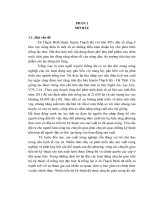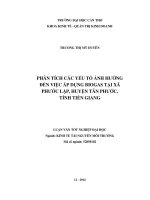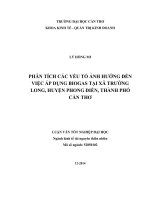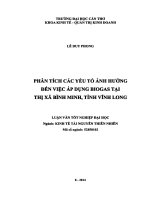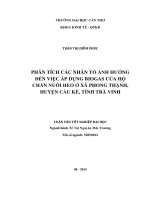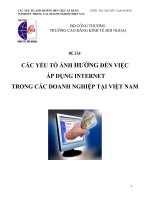Các yếu tố ảnh hưởng đến việc áp dụng hệ thống kế toán chi phí ở một số công ty du lịch được lựa chọn tại hà nội việt nam
Bạn đang xem bản rút gọn của tài liệu. Xem và tải ngay bản đầy đủ của tài liệu tại đây (867.55 KB, 86 trang )
ThAi nguyen University
..
Southern Luzon STATE University
Socialist Republic of Vietnam
Republic of Philippines
THE FACTORS AFFECTING THE ADOPTION OF
COST ACCOUNTING SYSTEM OF SELECTED
TRAVEL AGENCIES IN HANOI, VIETNAM
A RESEARCH PRESENTED TO THE FACULTY OF GRADUATE SCHOOL
SOUTHERN LUZON STATE UNIVERSITY LUCBAN, QUEZON, PHILIPPINES
THAI NGUYEN UNIVERSITY S.R. VIETNAM
IN PARTIAL FULFILLMENT OF THE REQUIREMENTS FOR THE
DEGREE DOCTORAL IN BUSINESS ADMINISTRATION
Name of Student
English Name
Date of Birth
Course
: DOAN THI QUYNH ANH
: ANGEL
: 05/01/1981
: SLSU-DBA1
Hanoi November, 2013
Page 1
ACKNOWLEDGMENT
During the conduct of my thesis, I would like to give my sincere thank to
advisors: Prof. Dr. Pete Ooi; Dr. Edwin Bernal . The advisors help me with detailed
guidance and instruction so that I can complete my research. Representatives from
Southern Luzon State University, ThaiNguyen University, ICT and academic affairs
together with teachers and staffs in ICT office has encouraged and helped from all the
members in the class.
When conducting the research, I receive the enthusiastic support and
participation of directors and staffs of all enterprises that I have research.
Beside that, I always receive the encouragement and support form my family.
I would like to express my sincere thanks to the advisors, staffs participating
in the research and my family for supporting me a lot.
Doan Thi Quynh Anh - Angel
Page 2
CONTENTS
ACKNOWLEDGMENT ............................................................................................................... 2
TABLE CONTENT................................................................................................................................ 3
LIST OF TABLE .................................................................................................................................... 4
LIST OF FIGURES ............................................................................................................................... 6
CHAPTER 1. INTRODUCTION ............................................................................... 7
CHAPTER II. REVIEW OF RELATED LITERATURE AND STUDIES ......... 15
CHAPTER III. METHODOLOGY ......................................................................... 39
CHAPTER IV. RESULTS AND DISCUSSIONS ................................................... 45
CHAPTER V. FINDINGS AND CONCLUSIONS ................................................ 75
REFERENCES ........................................................................................................... 79
Page 3
TABLE OF CONTENTS
Table 3.1. Factors affecting the adoption of the cost accounting system .............. 40
Table 4.1 Respondents’ Age and Gender ................................................................ 46
Table 4.2. Respondents’ Position and Field of Specialization ................................ 47
Table 4.3. Perceived Level of Awareness and Understanding of Cost Accounting
System ......................................................................................................................... 49
Table 4.4.. Perceived Ease of Use of Cost Accounting System ............................... 52
Table 4.5. Perceived Usefulness of Cost Accounting System ................................ 54
Table 4.6. Attitude Toward Adherence to Cost Accounting System inCost
Management ............................................................................................................... 57
Table 4.7. Summary Table on Respondents’ Perception and Attitude Towards
Adoption of Cost Accounting System....................................................................... 59
Table 4.8. The relationship between the accountants’ and the managers’
perception of their level of awareness and understanding of the cost accounting
system in travel agencies Crosstabulation ............................................................... 60
Table 4.9 Chi-Square Tests ....................................................................................... 62
Table 4.10. The relationship between the accountants’ and the managers’
perception on the ease of use of the cost accounting system in travel agencies
Crosstabulation .......................................................................................................... 63
Table 4.11. Chi-Square Tests .................................................................................... 64
Page 4
Table 4.12. The relationship between the accountants’ and the managers’
perception on the usefulness of the cost accounting system in travel agencies
Crosstabulation .......................................................................................................... 65
Table 4.13. Chi-Square Tests .................................................................................... 66
Table 4.14. The relationship between the accountants’ and the managers’
attitude toward use of the cost accounting system in travel agencies
Crosstabulation .......................................................................................................... 67
Table 4.15. Chi-Square Tests .................................................................................... 68
Table 4.16. Independent Samples Test ..................................................................... 70
Table 4.17. Independent Samples Test ..................................................................... 71
Table 4.18. Independent Samples Test ..................................................................... 72
Table 4.19. Independent Samples Test ..................................................................... 73
Page 5
LIST OF FIGURES
Fig 1 Classification of cost in travel agencies ......................................................... 31
Fig 2 Conceptual framwork ..................................................................................... 39
Page 6
CHAPTER 1
INTRODUCTION
1.1 Research Background
As
Vietnam
rides
in
the
development
of
world
economy,
its
hospitality/tourism industry had gained remarkable leap. Demand in a wide-range of
hospitality-related products and services increased as people's living standard
improved. This included products and services in travel services which is one sector
in the multi billion-dollar world-wide hospitality industry.
Products and service in a travel agency are designed to satisfy special needs of
consumers such as understanding the culture, tradition and the historical treasures of
one locality, appreciating natural beauty of the place, experiencing the climate, foods,
events and festivities of the area, and a lot of activities simply designed for
sightseeing and for rest and recreation. The demand for travel products and services
is not very stable as it easily changes due to instability of the climatic condition, and
the economic and political situation of the particular tourism destination. It therefore
requires that players in the travel business to be more creative and innovative to
anticipate changes in the business landscape in order to cushion the impact of slack
time in the business.
On one hand, it also requires that industry players fully grasp the
characteristics of tourism and travel products to be able to organize business activities
that optimally meet the needs of clients and ensure enhanced business performance on
the basis of strict cost control. It also requires strong organizational skills as well as
Page 7
understanding of the upstream and downstream links and costs which are, more often
than not, not too easy to quantify as transfers of values take place with the transfer of
intangible subject of business transactions. While application of sound managerial
accounting techniques and concepts is inevitably necessary, all must start from the
solid understanding and appreciation of cost accounting and the adoption of
appropriate cost accounting system.
Summarily, determining the cost of products and services in a travel agency
poses a great challenge for the firm’s accountants and managers in as much as the
business’ price offerings depend largely on the relevant costs. Doubly challenging is
the implementation of a firm’s policy on cost allocations because this requires a deal
of rationalization so as not to overburden one product/service while others
overburdened with unnecessary costs. This therefore requires the identification and
the use of appropriate cost driver to achieved full rationalization of the system.
Further, to achieve comparative and competitive advantages, it is necessary that, costs
associated with the implementation of activities in major business functions along the
value chains should be analyzed as to whether these are value-adding or non-value
adding costs. Obviously, only value adding activities are client-focused activities and
therefore add to the achievement of the value expectations of the clients. While cost
accounting is a necessary requirement to achieve more in the travel business in Hanoi,
less has been benefiting fully from it. To determine the factors that drive the sector to
adopt cost accounting system is the major reason why this research was conducted.
Page 8
1.2.
Statement of the Problem
This research focused on determining the factors which affect the adoption of the cost
accounting system of selected travel enterprises in Hanoi. Specifically, it tried to find
answers to the following research questions:
1.
What is the profile of the respondents in terms of gender, age, position and
field of specialization?
2.
What is the accountants’ and the managers’ perception of their level of
awareness and understanding, ease of use, and usefulness of cost accounting system?
3.
What factors are significantly affecting the attitude of the accountants and the
managers of travel agencies in adopting a cost accounting system?
4.
Is there any difference in the accountants’ and the managers’ perception of
their level of awareness and understanding, ease of use, and usefulness of cost
accounting system?
5.
Is there any difference between the accountants’ and the managers’ attitude
towards adherence to the cost accounting system in the management of costs in travel
agencies?
1.3.
Statement of Objectives
The general objective of this research was to determine the significant factors
affecting the adoption of cost accounting system for Hanoi-based travel agencies. It
seek to meet the requirements of the following specific objectives:
1.
To determine the profile of the respondents in terms of gender, age, position
and field of specialization.
Page 9
2.
To describe the accountants’ and the managers’ perception of their level of
awareness and understanding, ease of use, and usefulness of cost accounting system.
3.
To identify the factors which significantly affect the attitude of the
accountants and the managers of travel agencies in adopting a cost accounting system.
4.
To statistically test the difference in the accountants’ and the managers’
perception of their level of awareness and understanding, ease of use, and usefulness
of cost accounting system.
5.
To statistically test the difference between the accountants’ and the managers’
attitude towards adherence to the cost accounting system in the management of costs
in travel agencies?
1.4.
Hypotheses
The following hypotheses were tested using inferential statistical tools:
Hypothesis 1: There is no relationship between the accountants’ and the managers’
perception of their level of awareness and understanding, ease of use, and usefulness
of cost accounting system and their attitude towards adoption of the same cost
accounting system in travel agencies.
Hypothesis 2:
There is no difference in the accountants’ and the managers’
perception of their level of awareness and understanding, ease of use, and usefulness
of cost accounting system.
Hypothesis 3: There is no difference between the accountants’ and the managers’
attitude towards adherence to the cost accounting system in the management of costs
in travel agencies.
Page 10
1.5.
Significance of the study
In integration trends and competitive at present, enhance the capacity of
Vietnamese businesses in particular and the economy in general in difficulties
economic conditions is a matter of necessity of Vietnam. One of the economic sectors
is considered Vietnam is the point of the travel industry. In order to raise capacity of
travel agencies, a series of measures was taken by tourism businesses to apply good
governance over their enterprises such as : building Vietnamese travel photos and
build good customer relations , manage travel activities , training of staff travel .... In
measure , cost management is one of the most important issue for each travel agencies
. One of the instruments that helps manage cost efficiently is cost accouting system in
cost mangement. This research concentrates on finding the factors affecting the
adoption of the cost accounting system in travel agencies.
This research conduct to analyze relationship between factors affecting the
cost accounting system in selected travel agencies. This study will be significant to
the following individuals and organizations:
For travel agencies and its key officers, this research indicates help finding the
key factors to apply the cost accounting system, they can use the results of this
research to find the factors affecting to the adoption of cost accounting system in their
enterprise.
Based on the results of this dissertation, managers and accountants in travels
agencies can making a plan to adopt the cost accounting management in their
enterprise with the target such as managial cost, , saving cost, decision making..
Page 11
1.6.
Scope and Limitation of the Study
Along with the system of the general theory of cost accounting system for
internal management, the thesis will analyze and assess the current perception of cost
accounting systems at some business travel company in Hanoi from which to finding
the factors affecting of adoption of cost accounting sytem for travel agencies in the
direction of modern cost accounting management system, which help the cost
management and providing useful information for the decision of the administrator.
With the aim of improving accounting system in travel company in Hanoi, and
the number of enterprises tourism in Hanoil multiple, complex components business
in different fields, so the authors concentrate on research of the cost accounting
system of 7 business describe the model tour travel service in Hanoi, including: A
state-owned enterprise specialized in the field of business travel, business travel in all
four areas received international, send international visitors, receives domestic tourists
and domestic tourists on Hanoi recent years that is Vietnam Travel and Marketing
transports Company. Two enterprises belong to VietNam national Administration of
Tourism are the State of Investment and Tourism Thang Loi and HaNoi Tourism
company. Three enterprises represent non-state enterprises as AsiaLink travel joint
stock Company; New Horizons travel joint stock company, SaoMai travel company.
Besides, the authors also conducted to survey 25 travel companies in the area of
Hanoi.
Page 12
1.7.
Operational Definition of Terms
The following terms has been operationally defined:
Cost accounting system: A cost accounting system is a system designed for
managers to help them make decisions and includes; input measurement basis,
inventory valuation method, cost accumulation method and cost flow assumption. The
type of costs that come into an inventory may be pure historical costing or standard
costing.
Cost accounting system is the process of collecting, analyzing and evaluating
alternative causes of action. A cost accounting system consists of five parts and they
include input measurement, inventory valuation, cost accumulation, cost flow
assumption and recording of inventory cost flows.
Cost is the value of money that has been used up to produce something, and
hence is not available for use anymore. In business, the cost may be one of
acquisition, in which case the amount of money expended to acquire it is counted as
cost. In this case, money is the input that is gone in order to acquire the thing. This
acquisition cost may be the sum of the cost of production as incurred by the original
producer, and further costs of transaction as incurred by the acquirer over and above
the price paid to the producer. Usually, the price also includes a mark-up for profit
over the cost of production.
More generalized in the field of economics, cost is a metric that is totaling up
as a result of a process or as a differential for the result of a decision. Hence cost is the
metric used in the standard modeling paradigm applied to economic processes.
Page 13
Travel agency is a private retailer or public service that provides tourism
related services to the public on behalf of suppliers such as airlines, car rentals, cruise
lines, hotels, railways, and package tours. In addition to dealing with ordinary tourists
most travel agencies have a separate department devoted to making travel
arrangements for business travelers and some travel agencies specialize in commercial
and business travel only. There are also travel agencies that serve as general sales
agents for foreign travel companies, allowing them to have offices in countries other
than where their headquarters are located.
Level of awareness and understanding of cost accounting system is
perception of accountants and managers of cost accounting system base on their
knowledge about accounting, cost, cost accounting system.
Ease of use of cost accounting system is perception of accountants and
managers of ease of use cost accounting system. The ease of use of cost accounting
system is show ability of accountants and managers using the cost accounting system.
Usefulness of cost accounting system is perception of accountants and
managers of use of cost accounting system. That is a wonderful tool for the
management. When it comes to measuring how wisely company resources are being
utilized, if offers a lot of advantages to the several end users like management,
employees, government, general public and creditors.
The
usefulness of cost
accounting system is its effect and result of usefulness of cost accounting system for
the accountants and managers work.
Page 14
CHAPTER II
REVIEW OF RELATED LITERATURE AND STUDIES
This chapter authors reviews the related literature and studies on travel
industry in Vietnam in general, Hanoi travel in particular. This chapter provides the
reader with sufficient theory about cost accounting, the usefulness of cost accounting
system. It will discuss theories framework and concepture framework , which is going
to be evaluated in following chapters.
2.1.
Review of Related Literature
2.1.1. The tourism industry and the travel sector
During the 53 years of establishment and development, travel industry has
always been interested in each period are determined location of tourism in the
economic development strategy of the country's socio-suit bridge revolution. In 53
years of development , not a long time for the development of an industry , but can
also see the strong upturn in both quantity and quality of Vietnam Tourism , is a in
important aggregate economic sectors, bringing profound cultural content that is
interdisciplinary, inter-regional and socialize high growth rate in recent times ,
including in crisis conditions Asian economic and natural disasters, widespread
epidemics, global conflicts and local wars and terrorism in many parts of the world in
recent years.
Vietnam tourism in 53 years of development, tourism industry has achieved
these results:
Page 15
1. Innovation , improve awareness about tourism perspective : The whole
industry has focused efforts to mobilize the intellectual and theoretical studies and
tests , practical summary of tourism development in the country, forming, proposed
system and gradually complete the view, guidelines and policies for tourism
development with the Party and the State .
2. Apparatus and management capacity of state for tourism , business travel
system is perfected , activity gradually adapt to the new regime.
3 . Mobilizing more and more resources to build infrastructure , improve the
quality and diversification of tourism products.
4 . The propaganda and promotion , tourism promotion is enhanced. In recent
years , the tourism industry has focused on the promotion of tourism in both the
domestic market and internationally . Promotion work is more focused : Established
Tourism Promotion Bureau ; had promotion for a period of 5 years ; gradually
improved professionalism , quality of events organized better . Tourism has actively
coordinated with Vietnam Airlines , Vietnam embassies abroad, the Ministry of
Culture - Information , news agencies and newspapers , broadcasting , organizing
many events tourism promotion overseas
5 . International cooperation is expanding , exploiting external resources.
6 . Achieve and maintain a high growth rate , the effect of socio- economic
growing and comprehensive.
There is such a result , the entire tourism industry has actively implemented
seriously and synchronization solutions, both at work perfecting the policy, state
Page 16
management, broadcast promotion, link and coordinate local businesses, enhance the
quality of services .. By the end of 2012, Vietnam had 1120 international tour
operators; 11,840 tourist guides have been issued cards, including cards 4,809
instructors and 7,031 local tourist guide card international travel and the total number
of tourist accommodation establishments all over the country is estimated at 13,500 to
285,000 chamber, in which: 57 hotels 5 star 147 hotels 4 star,335 hotels 3 star.
Vietnam Tourism to identify some key tasks in 2013 include : Continue to
implement the development strategy of Vietnam's tourism in 2020, with a vision to
2030, deployment of the planning scheme, other resorts according to the master plan
on development of Vietnam Tourism 2020 vision 2030 after being approved by
continued deployment tasks improve the quality and efficiency of tourism statistics;
promote activities E - tourism marketing and branding Vietnam tourism logo and
slogan associated with the new deployment scheme to attract tourists from 8 key
tourism markets of China , Japan , Korea , Malaysia , Thailand , Australia , France ,
Russia , to exploit tourism development Ha Long Bay and a number of other
prominent points to ensure the sustainability and high economic efficiency, image
building heritage tourism Vietnam, Ha Long Bay...
2.1.2. Travel business in Hanoi
Hanoi is located and beautiful location, conveniently, is the capital, the center
of politics, economy, culture scientific, and important traffic of the country. As one of
the largest tourist centers of the country, Hanoi plays a very important role in the
tourism development of the country in general and in particular of Tonkin.
International tourist arrivals to Hanoi for about 30 % of visitors to Vietnam. With the
advantage of historical, cultural capital , domestic tourists to Hanoi at the forefront of
Page 17
the country. Hanoi is also a center for receiving and distribution of tourists travel to
the northern region and the other regions in the territory of Vietnam as well as to
countries in the region .
It has long become destinations Hanoi attracts international travelers largest
country by ancient beauty , quiet , elegant . Hanoi tourism natural resources and rich
humanistic , systematic Hanoi lakes make up a very particular landscape values of
Hanoi West Lake , Hoan Kiem Lake , Quan Son Lake , Suoi Hai , Van Tri ... special
dress relic Thang Long Imperial Citadel , Giong festival at Phu Dong temple and
temple Soc , Ca tru is recognized by UNESCO as a world cultural heritage , in
addition, the system epitaph Dr. Le Mac at Van Mieu Quoc Tu Giam was recognized
as a UNESCO world documentary heritage of world program of UNESCO memories
. Thus, Hanoi has always been appreciated by the international tourists as an attractive
destination .
This is more significant when the Hanoi area was expanded 3.6 times the old
area , with a population of over 6.5 million people , opens up the potential for the
tourism industry . With nearly 5,000 sites , of which 803 sites have been ranked ,
ranked first in number of historical monuments , eligibility to develop cultural tourism
, historical , spiritual ... In addition to the advantage of monuments , landscapes
historical land of thousand years of civilization , Hanoi is emerging as the ideal
location for eco-tourism , leisure and entertainment .
Along with the expansion of the administrative boundaries of Hanoi more
unique tourist destinations catering . Hanoi currently has a number of eco-tourism
service quality is relatively good Tan Da, King Pond, about Green - Suoi Tien, Asian .
Page 18
There are also some resort entertainment as Bao Son Paradise ( Hoai Duc ) , Vietnam
Phu Thanh Chuong , Ho Tay Water Park ... large scale has come into operation .
Hanoi is also home to cultural establishments systems , information center of
the country such as radio , television , theater major , major museums , the performing
arts theater folk as rowing , water puppetry is very attractive to international travelers
and domestic .
Since several years , Hanoi has always been a number of prestigious travel
magazine as the World 's leading Travel and Leisure ( U.S. ) , Smart Travel Asia (
HKG ) held a vote and won the title of Top 10 tourist destinations most of Asia.
International visitors to Hanoi increasing number of customers rose by an
average of 18-20 % . In 2008, Ha Noi welcomes 1.3 million , in 2009 due to the
global economic crisis and the disease is 1.02 million visitors ; 2010 with a
celebration event in 1000 thousand years of Thang Long - Hanoi Cabinet and the
National Tourism Year, Hanoi arrivals increased, the total number of 1.7 million;
2011 welcomed 1.84 million international passengers; 2012 Hanoi welcomes over 2
million international tourist arrivals .
Markets domestic tourists to Hanoi large proportion of the country 's leading ,
with an average annual passenger traffic accounted for over 20 % of domestic tourists
in Vietnam . In 2002, Hanoi welcomes 2.8 million , by 2009 had brought 9.2 million ,
in 2010 to reach 10.6 million; in 2011 to reach 11.6 million; in 2012 to reach over 12
million passengers .
Domestic Tourists to Hanoi with many different purposes and from all
provinces of the country , in which visitors to Hanoi for tourism purposes traveling,
Page 19
visiting relatives and healing . Visitors to in Hanoi , stay at hotels 38.6 % , 24.4 %
Guest House , Lodging and 21.8 % in the friends and relatives about 15.2 % ( by
relatives and visitors rate Hanoi to therapy rather large ) . Shopping is a pastime of
tourists , especially domestic tourists . Spending on shopping accounted for the
highest proportion , 27.7 % of the total expenditure , followed by eating 22.5 % , 22.1
% accommodation , transport and entertainment respectively 10 , 2 and 9.4 % .
On Hanoi now has nearly 500 International travel agencies and nearly 500
domestic travel agencies, has about 50 companies and individual business households
transporting tourists. Hanoi focused cultural institutions of the country such as the
Opera House , the National Cinema Center, the major museums, the performing arts
theater folk as rowing, water puppetry very attractive with international travelers and
domestic .
Park system as Lenin Park , Thu Le Park , Park Dong Da , Youth Park , West
Lake Water Park , Bao Son Paradise Park , Vietnam .... Phu Thanh Chuong are
increasingly becoming tourist attractions are concerned .
Activity culinary tour of Hanoi were strongly developed , the high
socialization , has given high capital position system travel the world and dining area .
The dining establishments in Hanoi last time the rapid development of rich and
diverse ethnic restaurants like Thai restaurants , Japanese restaurants , Korean
restaurants to bars , caffe , pubs snack of the world's major corporations like KFC ,
Lotteria ... were present in Hanoi , meet the culinary needs of the great majority of
visitors and residents of Hanoi.
Page 20
Food service establishments , food restaurants such as Europe , Asia , coffee
and bar facilities developed increasingly . In recent years the city has made the
construction of pilot Tong Duy Tan street food to introduce culinary arts and Hanoi,
Vietnam .
In the future , the direction of Hanoi is the optimal exploitation of valuable
natural resources , the value of cultural heritage , historical diversification and the
development of tourism products typical of the capital Hanoi focuses mount tourism
development with protection of natural resources and the environment. Improving the
quality of products and services for tourism, and improving the quality of human
resource development Hanoi tourism as a whole.
2.1.3. Accounting as the language of business
Traditionally, accounting has been defined as the process of recording,
classifying and reporting the fianancial activities and transactions of a business
enterprise. The process of recording and classifying business transactions is
commonly referred to as bookeeping. The bookkeeping function of accounting skill
forms the foundation of much accounting activity. An accountant is usually defined as
“one who is skilled in accounting”. Ta the beginning of the twentieth century,
however, the role of accountantdid not extend much beyond a bookkeeping function,
that is, the keeping od records according to a set of well-defined rules and procedures.
At this time, accountants were generally reffered to as “bookkeeper”. In the bissiness
world of the twenty-first century the activities and responsibilities af accountants
extend far beyond mere bookeeping and the keeping records. They include the
interpretation and analysis of accounting report, the design and operation of computer
Page 21
based system, the planning and conduct of business activities, and the understanding
the complex accounting regualtions that have accumulated over many years.
Accountants serve a potentially wide variety of user groups. The many
different users of accounting informarion include the owners or shareholders of a
business entity, the people who have lend money to the entity, the entitys’ employees,
government agencies and other social and political interrest group, such as
environment group anf trade unions. In providing information for these users,
accountants frequently need to consider more thanjust fianacial factors.
Accounting has a wide-ranging fuanction and hence abroad definition of the
field of accounting is needed, one that embraces the variety of professional activities
engaged in by accountants.
Serveral years ago a committee og the American
Accounting Association defined accounting beyond its mere traditional definition (the
recording, classifying and reporting of transaction). This committee defined
accounting in a broader and more modern context as the process of identifying,
measuring and communicating economic information to permit informed judgements
and decisions by users of information.
Accounting is called the language of the business in the sense that the
responsibility of learning accounting is very similar to the task of erudition a new
language ,it is complicated by the fact that heaps words used in accounting mean
almost the same but not fairly the same thing as the identical words scrounging in
everyday non -accounting usage.
Page 22
2.1.4. Cost accounting and cost accounting system – uses and importance
Cost accounting is a process of collecting, analyzing, summarizing and
evaluating various alternative courses of action. Its goal is to advise the management
on the most appropriate course of action based on the cost efficiency and capability.
Cost accounting provides the detailed cost information that management needs to
control current operations and plan for the future. Since managers are making
decisions only for their own organization, there is no need for the information to be
comparable to similar information from other organizations. Instead, information
must be relevant for a particular environment. Cost accounting information is
commonly used in financial accounting information, but first we are concentrating on
its use by managers to make decisions.
Unlike the accounting systems that help in the preparation of financial
report periodically, the cost accounting systems and reports are not subject to rules
and standards like the . As a result, there is wide variety in the cost accounting
systems of the different companies and sometimes even in different parts of the same
company or organization.
A method of accounting in
which
all costs incurred in
carrying
out
an activity or accomplishing a purpose are collected, classified, and recorded.
This data is then summarized and analyzed to arrive at a selling price, or to determine
where savings are
possible.In
contrast
to financial
accounting (which
considers money as the measure of economic performance) cost accounting considers
money as the economic factor of production.
Cost accounting is an approach to evaluating the overall costs that are
associated with conducting business. Generally based on standard accounting
Page 23
practices, it is one of the tools that managers utilize to determine what type and how
much expenses is involved with maintaining the current business model. At the same
time, the principles of cost accounting can also be utilized to project changes to these
costs in the event that specific changes are implemented.
When it comes to measuring how wisely company resources are being
utilized, cost accounting helps to provide the data relevant to the current situation. By
identifying production costs and further defining the cost of production by three or
more successive business cycles, it is possible to note any trends that indicate a rise in
production costs without any appreciable changes or increase in production of goods
and services. By using this approach, it is possible to identify the reason for the
change, and take steps to contain the situation before bottom line profits are impacted
to a greater degree.
Product development and marketing strategies are also informed by the use of
cost accounting. In terms of product development, it is possible to determine if a new
product can be produced at a reasonable price, considering the cost of raw materials
and the labor and equipment necessary to produce a finished product. At the same
time, marketing protocols can make use of this type of accounting to project if the
product will sell enough units to make production a viable option.
Cost accounting is helpful in making a number of business decisions. By
weighing the actual costs versus the anticipated benefit, it can help a company to
avoid launching a product with no real market, prevent the purchase of unnecessary
goods and services, or alter the current operational model in a manner that will
decrease efficiency. Whether utilized to evaluate the status of a department within the
company or as a tool to project the feasibility of opening new locations or closing
Page 24
older ones, cost accounting can provide important data that may impact the final
decision.
A cost accounting system (also called product costing system or costing
system) is a framework used by firms to estimate the cost of their products for
profitability analysis, inventory valuation and cost control.
Estimating the accurate cost of products is critical for profitable operations. A
firm must know which products are profitable and which ones are not, and this can be
ascertained only when it has estimated the correct cost of the product. Further, a
product costing system helps in estimating the closing value of materials inventory,
work-in-progress and finished goods inventory for the purpose of financial statement
preparation.
There are two main cost accounting systems: the job order costing and the process
costing.
Job order costing is a cost accounting system that accumulates manufacturing
costs separately for each job. It is appropriate for firms that are engaged in production
of unique products and special orders. For example, it is the costing accounting
system most appropriate for an event management company, a niche furniture
producer, a producer of very high cost air surveillance system, etc.
Process costing is a cost accounting system that accumulates manufacturing
costs separately for each process. It is appropriate for products whose production is a
process involving different departments and costs flow from one department to
another. For example, it is the cost accounting system used by oil refineries, chemical
producers, etc.
Page 25



